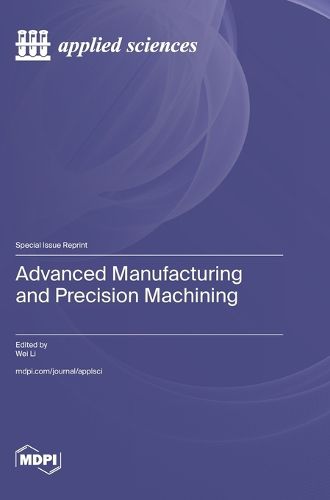Readings Newsletter
Become a Readings Member to make your shopping experience even easier.
Sign in or sign up for free!
You’re not far away from qualifying for FREE standard shipping within Australia
You’ve qualified for FREE standard shipping within Australia
The cart is loading…






This title is printed to order. This book may have been self-published. If so, we cannot guarantee the quality of the content. In the main most books will have gone through the editing process however some may not. We therefore suggest that you be aware of this before ordering this book. If in doubt check either the author or publisher’s details as we are unable to accept any returns unless they are faulty. Please contact us if you have any questions.
Advanced manufacturing is a core technological domain critical for modern industrial transformation and enhancing global competitiveness. By deeply integrating traditional manufacturing with technologies such as electronic information, computer science, materials engineering, and intelligent control, it significantly improves manufacturing precision, efficiency, and sustainability. Precision machining, as an essential part of this field, provides key technical support for high-tech industries such as aerospace, medical devices, and semiconductors, including the production of high-performance components such as gears, bearings, and screws. With advancements in precision machining technology, production is not only more refined but also significantly enhanced in terms of efficiency and product quality. This Special Issue, "Advanced Manufacturing and Precision Machining," consists of ten peer-reviewed papers and explores the latest developments in the field of precision machining, with a focus on balancing high precision and high efficiency in complex manufacturing environments. As intelligent and digital technologies continue to advance, the future of advanced manufacturing will be more efficient, intelligent, and green. Interdisciplinary innovation and technological integration play an increasingly important role in driving progress. This Special Issue can provide crucial theoretical support and practical guidance for researchers and industry professionals.
$9.00 standard shipping within Australia
FREE standard shipping within Australia for orders over $100.00
Express & International shipping calculated at checkout
This title is printed to order. This book may have been self-published. If so, we cannot guarantee the quality of the content. In the main most books will have gone through the editing process however some may not. We therefore suggest that you be aware of this before ordering this book. If in doubt check either the author or publisher’s details as we are unable to accept any returns unless they are faulty. Please contact us if you have any questions.
Advanced manufacturing is a core technological domain critical for modern industrial transformation and enhancing global competitiveness. By deeply integrating traditional manufacturing with technologies such as electronic information, computer science, materials engineering, and intelligent control, it significantly improves manufacturing precision, efficiency, and sustainability. Precision machining, as an essential part of this field, provides key technical support for high-tech industries such as aerospace, medical devices, and semiconductors, including the production of high-performance components such as gears, bearings, and screws. With advancements in precision machining technology, production is not only more refined but also significantly enhanced in terms of efficiency and product quality. This Special Issue, "Advanced Manufacturing and Precision Machining," consists of ten peer-reviewed papers and explores the latest developments in the field of precision machining, with a focus on balancing high precision and high efficiency in complex manufacturing environments. As intelligent and digital technologies continue to advance, the future of advanced manufacturing will be more efficient, intelligent, and green. Interdisciplinary innovation and technological integration play an increasingly important role in driving progress. This Special Issue can provide crucial theoretical support and practical guidance for researchers and industry professionals.